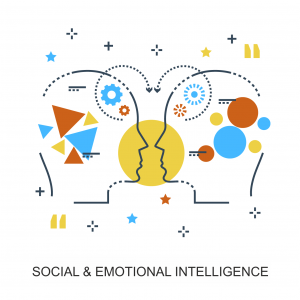Difference between IQ, EQ and SQ – the Social Intelligence, and why SQ is the future!
Difference between IQ, EQ and SQ – the Social Intelligence, and why SQ is the future!
First it was Intelligence quotient – IQ. Formulated by psychologists like Alfred Binet and later conceptualized by psychologist William Stern,IQincludes qualities like analytical skills, logical reasoning, ability to relatemultiple things, and ability to store and retrieve information. IQ tests check this through various questions related to reading comprehension, data interpretation, logical reasoning, verbal ability, visual-spatial reasoning, classification, analogies and pattern-detection.
Then came Emotional Intelligence – EQ. Conceptualized by psychologists like Michael Beldoch and later popularized by psychologist Daniel Goleman,EQ includes some key competencies which then have further subheads viz. self-awareness which includes emotional awareness, self-assessment & self-confidence; self-regulation which includes self-control, trustworthiness, conscientiousness, adaptability & innovativeness; self-motivation which includes drive, commitment, initiative & optimism; social awareness which includes empathy, service orientation, developing others, leveraging diversity, and political awareness; and social skills which include influence, communication, leadership, change management, conflict management and cooperation.
And then came Social Intelligence – SQ. Postulated by psychologist Edward Thorndike,it was later reinvented by psychologists like Howard Gardner and Daniel Goleman. Gardner proposed that there are multiple intelligences, out of which he talked about two important ones intrapersonal intelligence and interpersonal intelligence. According to him, interpersonal intelligence includes sensitivity towards others’ moods, feelings, temperaments and motivations; and ability to cooperate as part of a group. Gardner equated it with Daniel Goleman’sEmotional Intelligence.
In later development, Goleman wrote his famous book Social Intelligence: The New Science of Social Relationshipsin 2006,through which he separated two of the emotional-intelligence competencies– social-awareness and relationship-management – into a separate concept social intelligence thus giving a new name ‘Emotional and Social Intelligence (ESI)’ to all the competencies he had earlier stuffed under one concentric term ‘EI’. This ESIhasbeen found to be the greatest differentiator between start performers and average ones today*.
Thus, social intelligence is extension or a superset of emotional intelligence. It is a broader concept than emotional intelligence. So, in a way, where emotional intelligence leaves, Social Intelligence takes it up from there, and makes it more of a tangible applicable skill.
However, according to us at Socialigence“Social intelligence is ability of a person to tune into other people’s emotions and read the subtle behavioral cues to choose the most effective response in a given situation”.And Social Intelligence will be the future! The reason is simple. Well! Every interpersonal interaction has an emotional subtext to it. And most of that emotional undertone gets manifested less through words and more through the nonverbal behaviors like gestures, expressions, postures, vocal cues or for that matter, the way one has shaped one’s personal environment.
Now, in order to excel in various roles that we play – be it that of a beloved, spouse, parent, friend, manager, marketer, teacher, leader etc., it is important to first have an insight into how emotions work and a skill to observe someone’s nonverbal behavior to understand the counterpart emotions in people we are relating to. It is not some talent you are born with. It is a skill that can be learnt, practiced and mastered**.
Talking specifically in terms of profession, the relative importance of IQ, EQ, and SQ would see a major shift towards the last two (in fact it has already started happening***). Moreover, in future, the biggest challenge would be posed by two Ts – Technology & Time. Due to ever-growing intervention of technology in all spheres of life and lack of time, the ‘life & work’ of a whole generation of people would take a new course.
So we would continue to see virtual teams, e-commerce, social networking sites,artificial intelligence, internet economy and much more to come.This would lead to a human disconnect that will adversely affect people’s relationships and associations at home and at workplace. As a result, social intelligence – the SQ – will be the keystone skill for the success and fulfillment in future.
*Researcher Lyle Spencer studied managers of a $2 billion global division of Siemens with 400 branches in 56 countries. When he compared the competencies of the star performers and average performers (Star performers were the Top 10% performers with average annual sales of $29.8 million against $17 million annual sales of average performers), he found that the differentiators were the four competencies of ESI (Emotional and Social Intelligence) and not a single technical or cognitive competency.
**When average-performing group of managers at one of Siemen’s global division were trained on ESI (Emotional & Social Intelligence) competencies, they added an additional $ 1.5 million in profit, double that of a comparison group which had no training.
***Researchers Goleman, Boyatzis& McKee analyzed years’ data of from close to 500 competence models from global companies including the likes of IBM, Lucent, PepsiCo, British Airways, and academic institutions and government agencies. To determine which capabilities drove outstanding performance in these organizations, they grouped capabilities into 3 categories: 1) Technical 2) Cognitive 3) ESI (Emotional & Social Intelligence).
After analyzing all the data, they found that ESI-based competencies played an increasingly important role at higher levels of organizations, where differences in technical skills are of negligible importance. Moreover, about 85% of the difference of star-performers’ profiles from average-performers was attributable to ESI-related factors.
Dr. Sandeep Atre (sandeepatre@socialigence.net)
Founder-Director, Socialigence (www.socialigence.net)
Reference.


Comments
Post a Comment